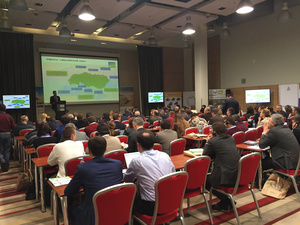Updates
Danube Soya Association
Development since May 2015
Danube Soya’s promising potential and the need for a sustainable agriculture is shown by its steady growth. Since May 2015, 26 members (23 full members, 3 associate members) joined the Danube Soya Association and could grew up to 210 members, resulting in a broad professional network that reaches across Europe. With the Control Union Certifications B.V from the Netherlands, Organic Standard Ltd. from Ukraine and LACON GmbH Deutschland from Germany, the association welcomed three more inspection bodies since May 2015. The association is proud that already 12 inspection bodies are authorized to work with it. Furthermore, the Danube Soya Association gained 40 new certified partners since then and does now have a total of 150 certified partners.
Also the certified amounts of Danube Soya highlights the great potential. Whereas 49,000 tons of Danube Soya were attested in 2014, the amount increased up to 84,000 tons in the end of 2015. The Non-Profit Organisation wants to achieve even more in 2016: up to 120-130,000 tons of certified Danube Soya are planned to be certified this year.
Not only the certified quantity of Danube Soya increased, but also the team of employees increased up to 25 as regional offices were opened in Ukraine (Inna Ilienko) and Moldova (Galina Lyashenko) in 2015. Additionally, Przemyslaw Gawlas is working for the association as a representative in Poland.
As 52 % of the European soya bean area are located in Ukraine in 2015, more and more activities have been organized there. Therefore, the association is delighted that in June 2015 Ukraine signed the Danube Soya Declaration – a commitment to a common European protein supply and Non-GM soya production.
In 2015 Danube Soya has received official word that the Danube Soya logo can be implemented in Serbia. From 2015 on Danube Soya products can be labelled in Serbia.
Besides that, Danube Soya could establish 8 demonstration platforms last year. Experiments on cultivars, plant protection, density and sowing time were organized on fields in Romania and in Bulgaria.
As countries beyond the Danube Region have also developed an interest in being a part of our network, the association has created Europe Soya. The Europe Soya Guidelines are based on those of Danube Soya, but are applied to soya also from European countries falling outside of the Danube Region. With that, certification is made possible in the entire region of Europe. Starting with the 2015 harvest Danube Soya can now be certified and purchased as organic for the first time.
Danube Soya supports good agricultural practice. This is why the association published in collaboration with FiBL from Switzerland a best practice manual for the cultivation of organic soya. In addition, Danube Soya will soon present the Best Practice Manual (in English) including cropping practises, which are in particular relevant to improve the environmental performance of soya bean production in the Danube Region.
Starting 2016, Danube Soya has taken a step towards more sustainability: since this year the use of desiccants and thus glyphosate during maturation is prohibited to all its farmers and within the whole Danube region. This leads to a significant reduction of glyphosate.
(Provided by Donau Soja on 2016-03-25)

